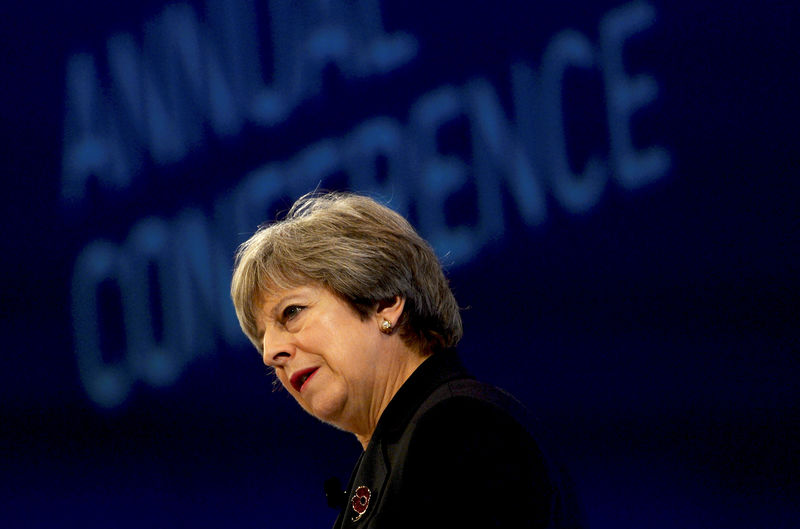 © Reuters. Britain’s Prime Minister Theresa May speaks at the Conferederation of British Industry’s annual conference in London
© Reuters. Britain’s Prime Minister Theresa May speaks at the Conferederation of British Industry’s annual conference in LondonBy Jan Strupczewski and Gabriela Baczynska
BRUSSELS (Reuters) – EU envoys discussed on Wednesday delaying into next year the launch of talks with London on a post-Brexit relationship, raising the risk of businesses shifting out of Britain due to lack of clarity on what will happen after March 2019.
A meeting of ambassadors from the other 27 EU states had been due to start discussing how to negotiate a transition that would start when Britain quits the bloc in 17 months. But instead, people familiar with the talks told Reuters, the discussion was dominated by concern that London would fail to meet EU conditions next month for opening future negotiations.
Once again, lead powers Germany and France insisted British Prime Minister Theresa May agree in principle to pay an exit bill in the tens of billions of euros to Brussels before EU leaders agree to open a second phase of Brexit negotiations on the future relationship. They told May at a summit last month that they were ready to do that when they next meet, on Dec. 14.
But British negotiators, who will be in Brussels on Thursday and Friday for more talks on that financial settlement, as well as rights for EU citizens and the Irish border, “should not think they are sailing ahead into the next phase”, an EU official familiar with the envoys’ discussions said.
“While the transition and future relationship were formally on the agenda, what ambassadors focused very much on was real concern that the UK does not realize that the EU27 are deadly serious about the need to meet the ‘sufficient progress’ mark on the three first-phase issues.”
With May struggling with the loss of a second scandal-hit cabinet minister in a week, Germany, France and others are ramping up pressure on her to cut a deal in the knowledge that businesses are piling on their own demands for clarity before making investment decisions in the new year.
“COME WITH THE MONEY”
“The focus was very much on the here and now and the fact that the UK is so far away from meeting the sufficient progress point and that we are rapidly running out of time,” the official added. Several diplomats gave similar accounts of the meeting.
“We should not be pressured or rushed. They really must come with the money,” one senior EU diplomat said.
The European Parliament, which must approve any withdrawal treaty, added its voice on Wednesday. Its Brexit coordinator, Guy Verhofstadt said May’s suggestion that agreement was close on citizens’ rights was wide of the mark and that “major issues” remained unresolved to guarantee rights for EU nationals.
The EU official said the ambassadors agreed that without “sufficient progress” on divorce issues in the next month, the talks would simply be extended into 2018 with no discussions on the future — talks that London is keen to start immediately.
“If they don’t move until early December, we’ll have to think again what to do next,” the senior diplomat said. “Then there could be a take it or leave it offer from us, which would clearly not be very nice to Britain and at home they would fall under immense pressure to walk away from the talks.”
Some Brexit backers in her own government have urged May to walk out without a withdrawal deal, arguing that the EU also has an interest in an orderly split and that the British economy can stand any disruption — a view not shared by many businesses.
Several EU officials said Britain would have to abide by all EU laws in the transition period, even if they are changed during that time, but would have no vote on them. And that such a transition, which both sides have said should last less than two years, might have to be extended to give time for a trade pact.
“It’s impossible to get any bespoke trade deal in two years or so,” said an EU parliament official who deals with Brexit. “And for all that time the UK would be an EU colony — forced to accept all our laws with no say.
“This is what I call a definition of colony.”
Source: Investing.com




























